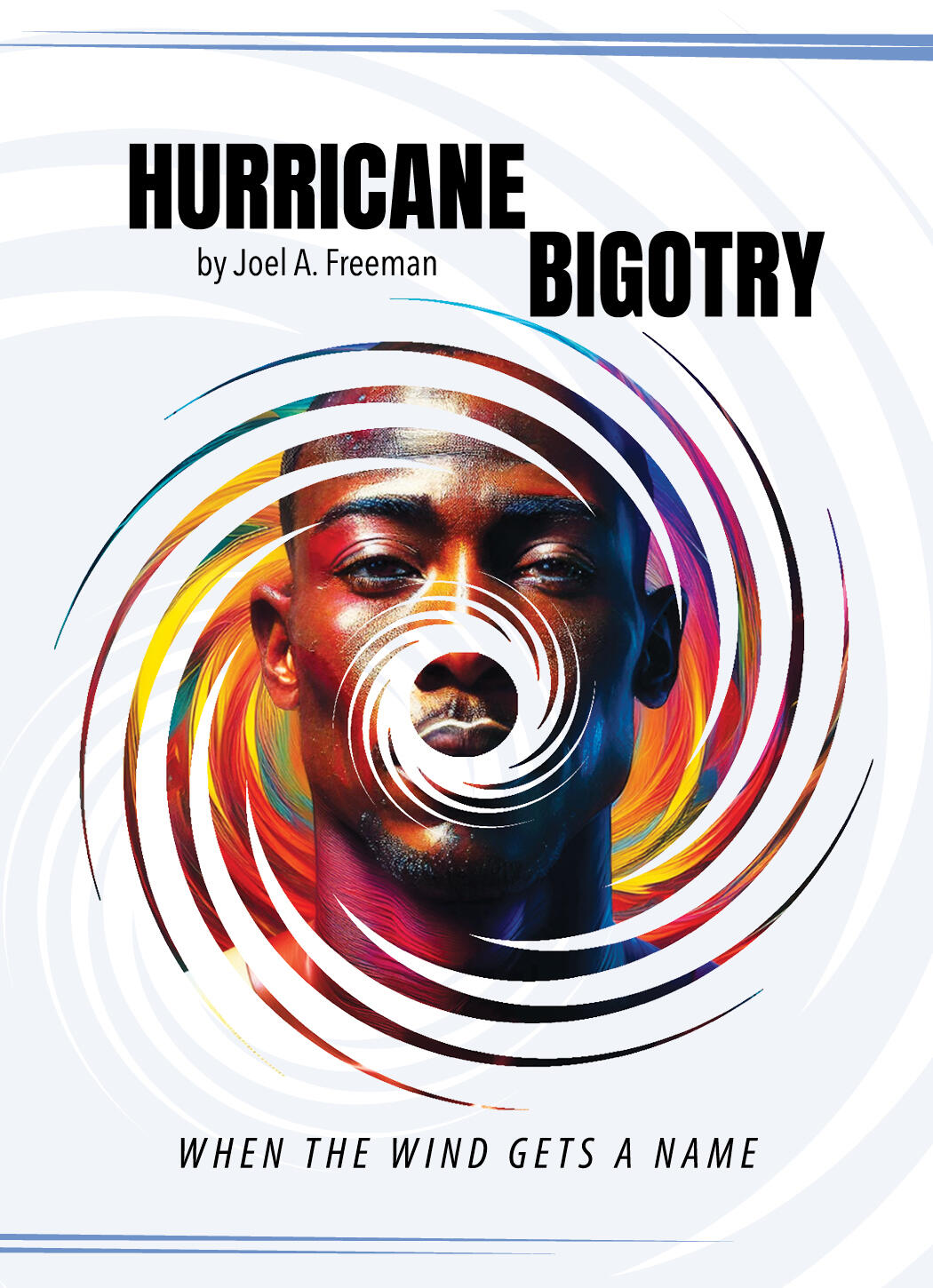
Watch the music video first, before reading my story behind the song.
CLICK BELOW
(3:25)
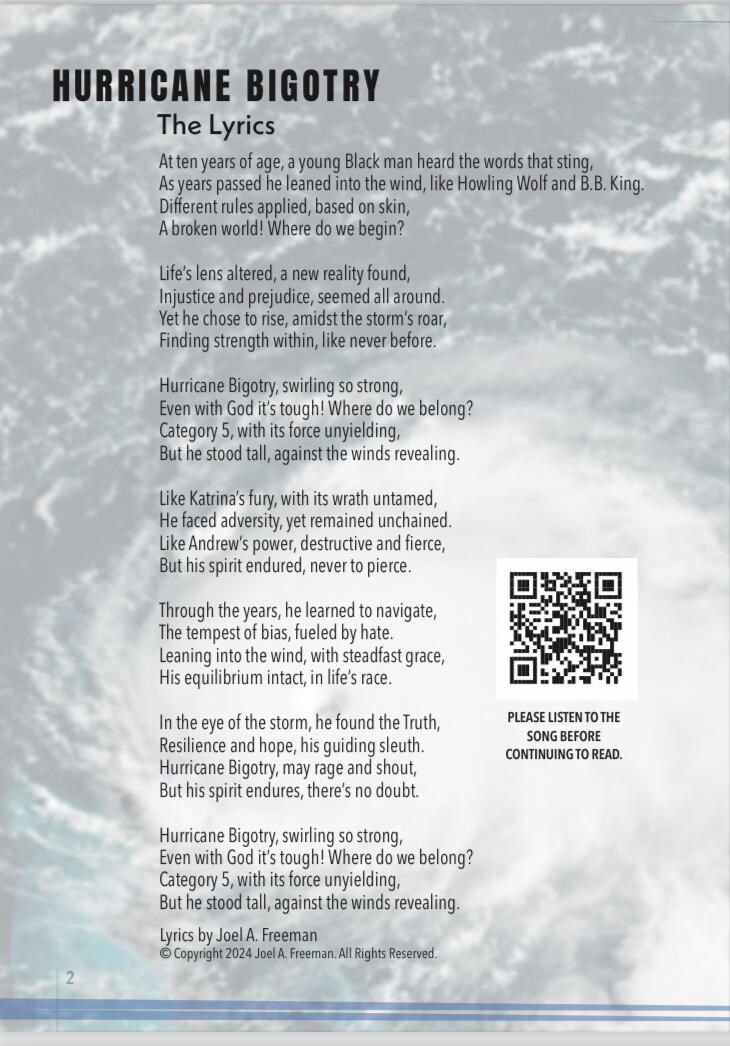
THE STORY BEHIND THE SONG
w/ Bonus Material Below
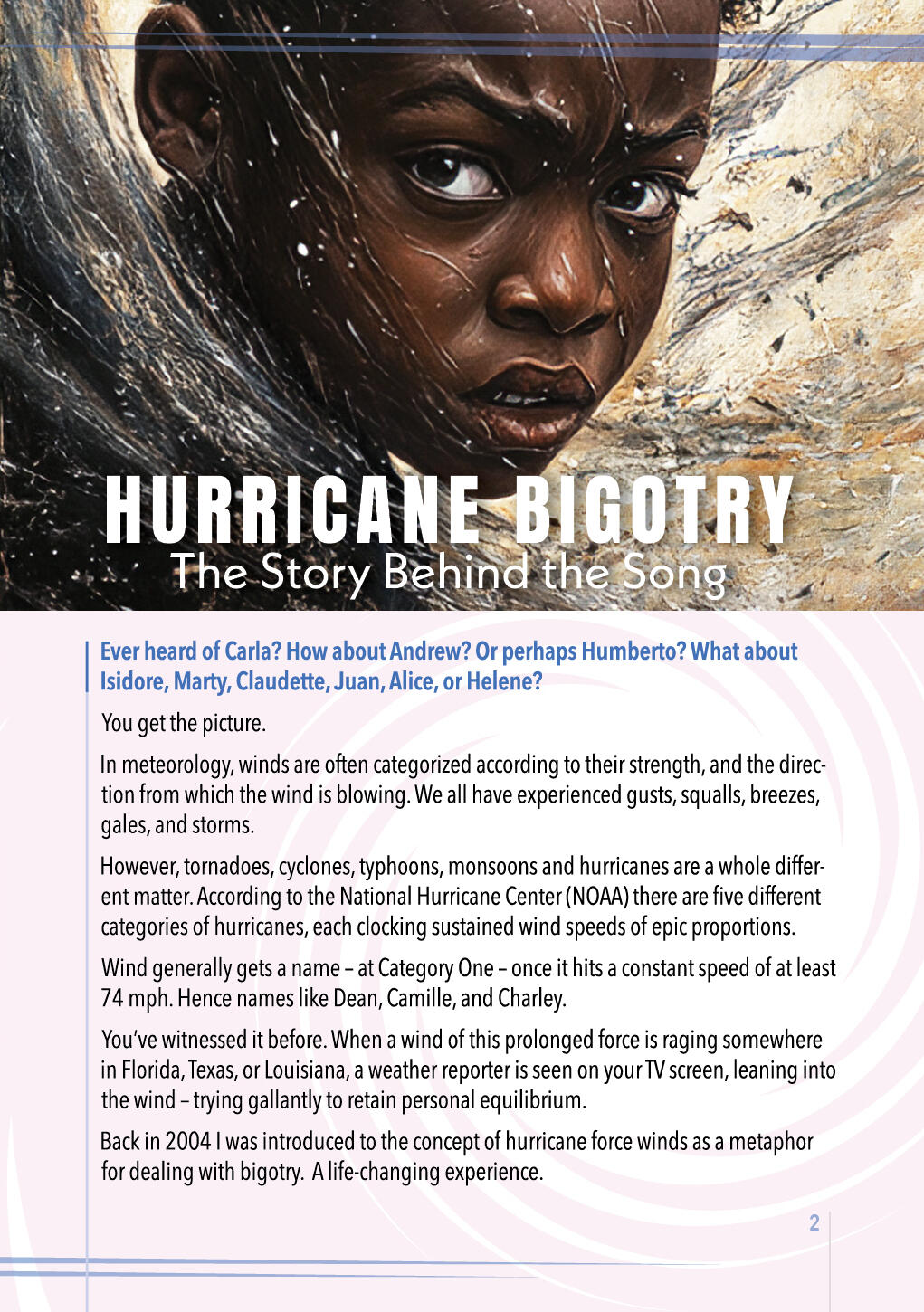

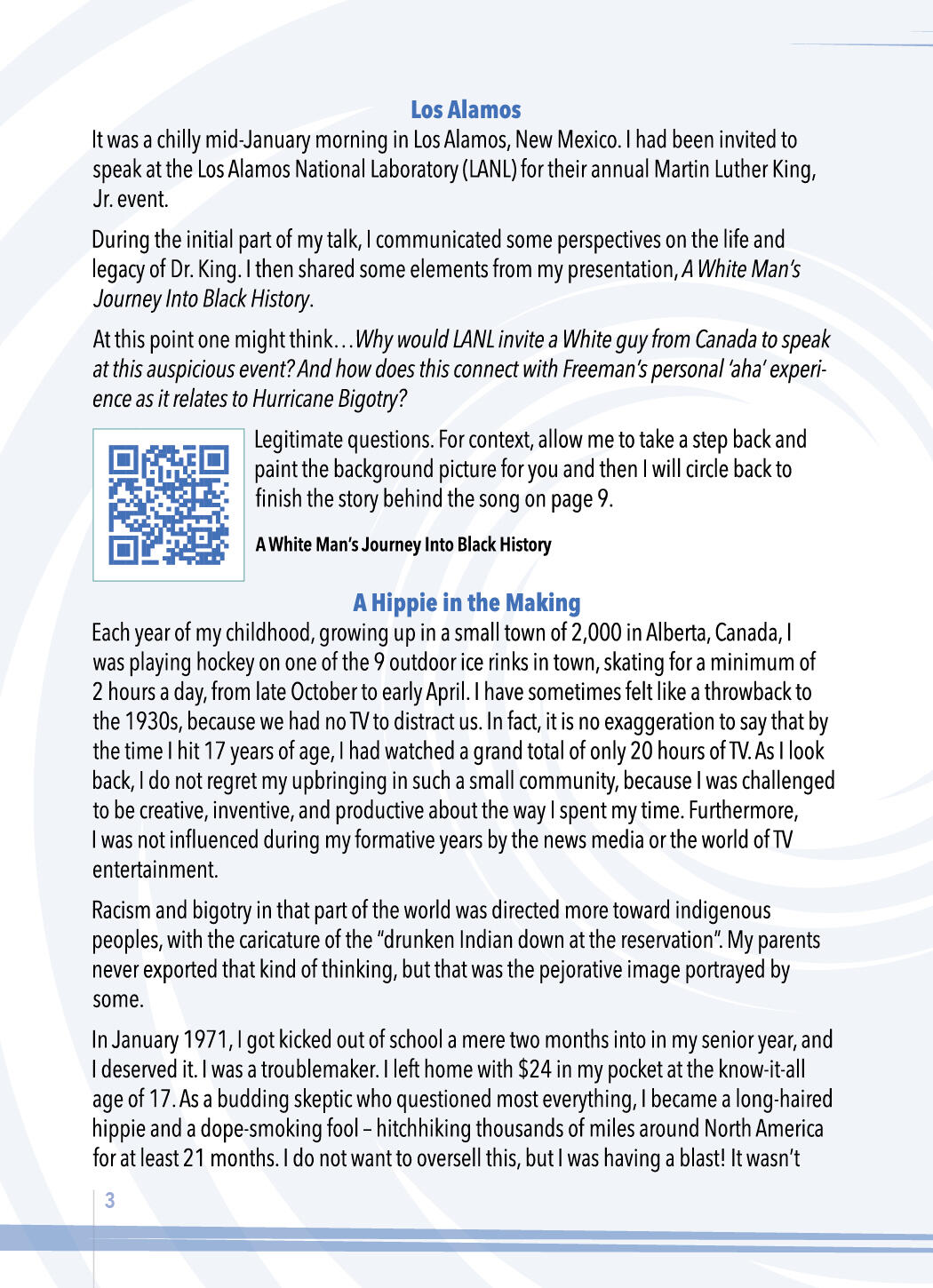
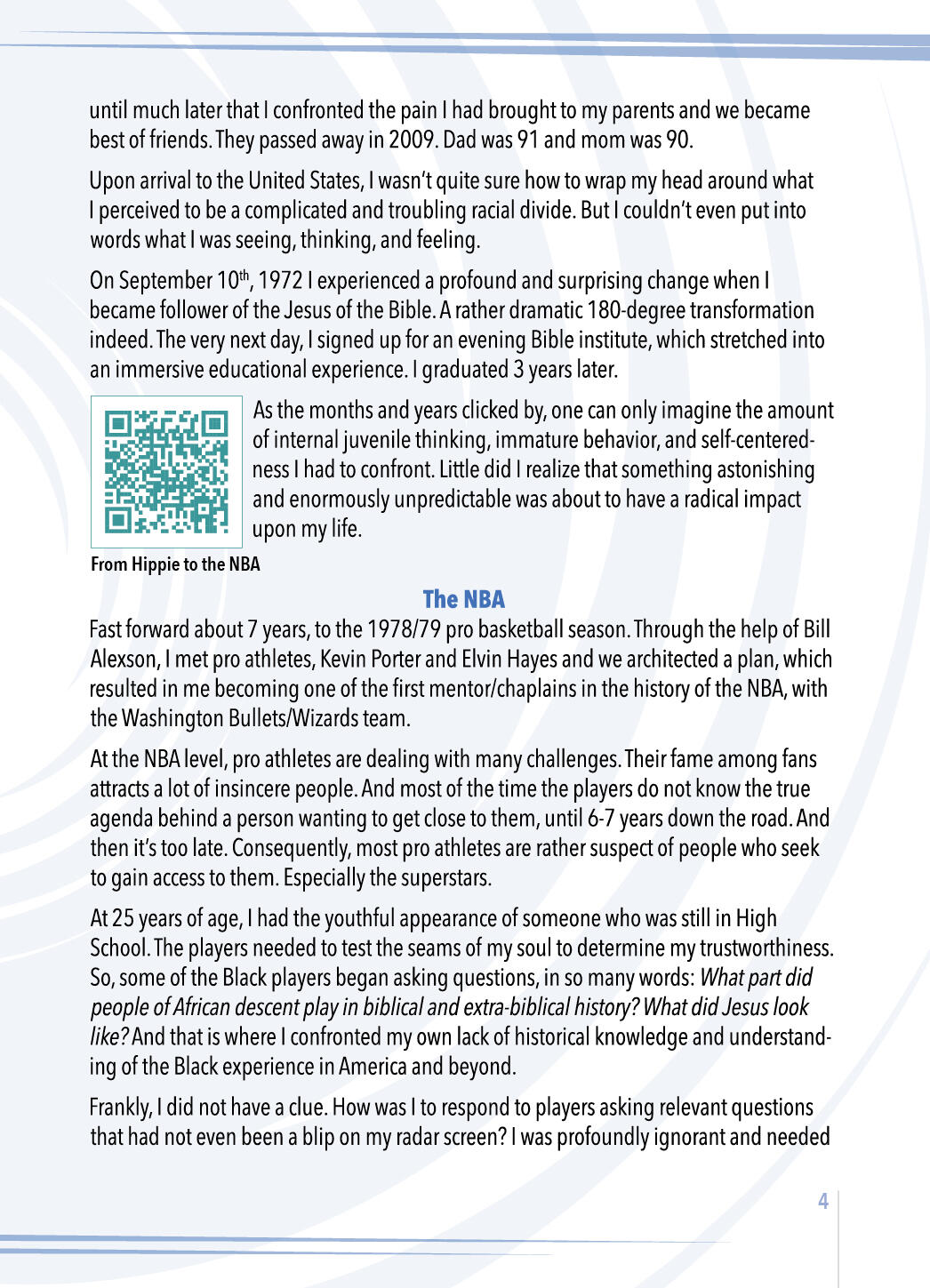
FROM HIPPIE TO THE NBA
CLICK BELOW
(7:45)
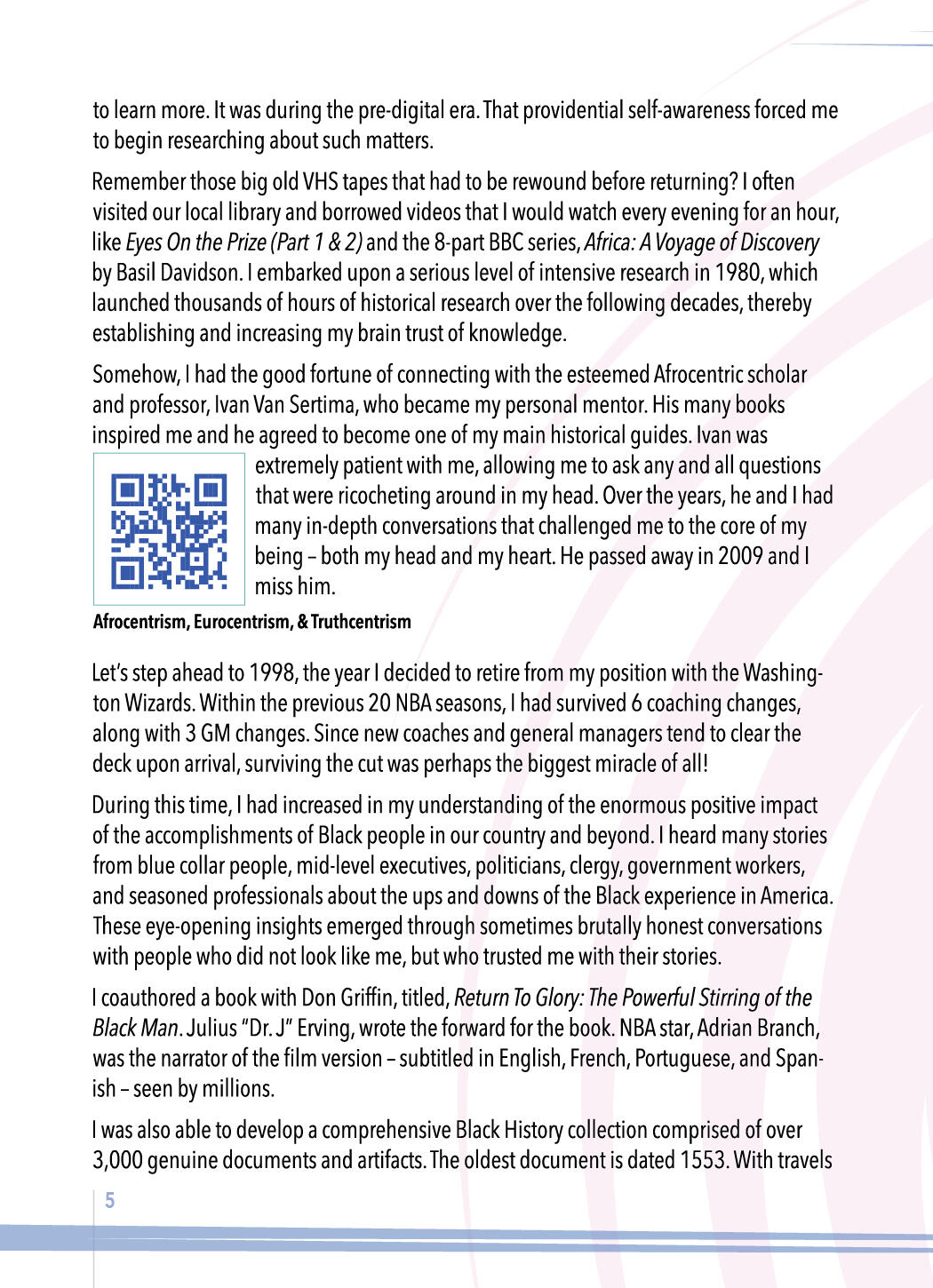
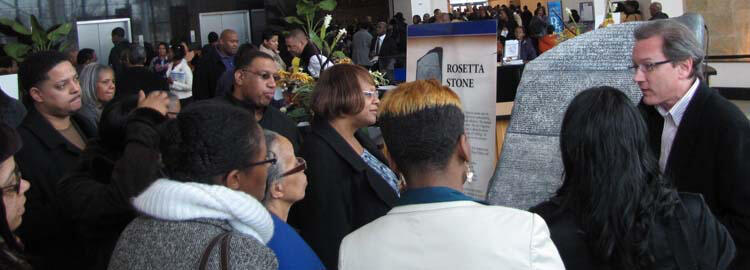
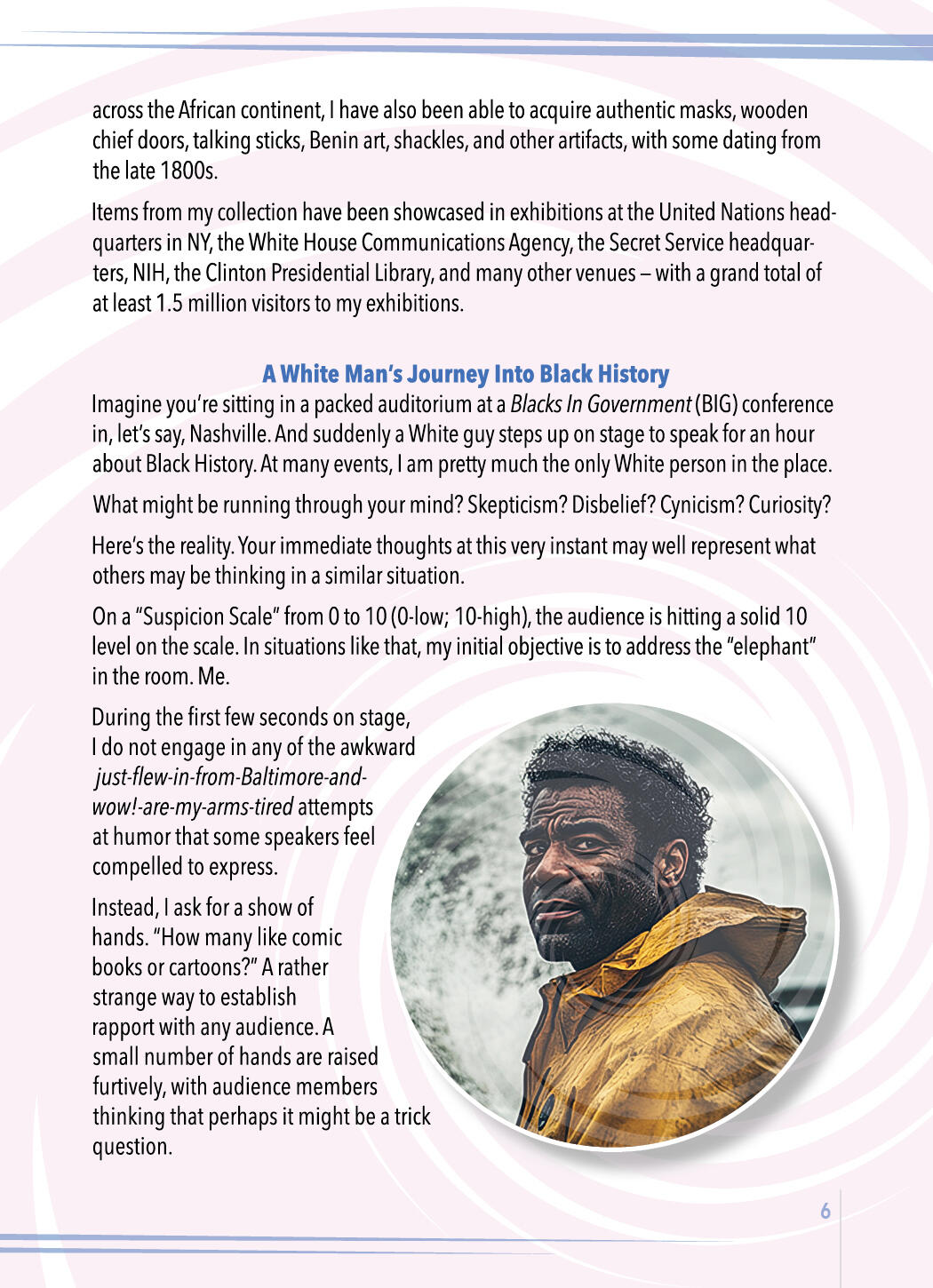
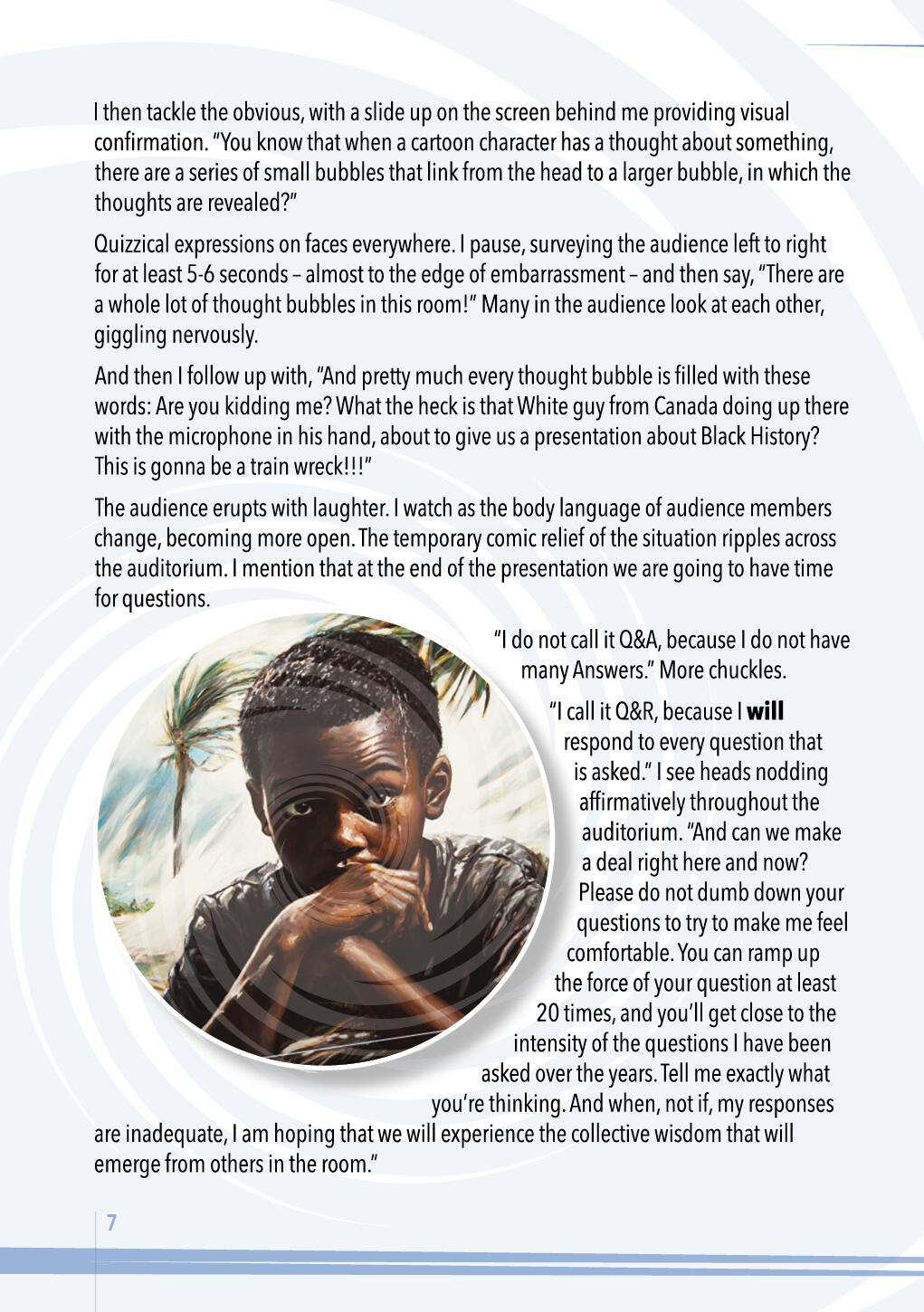
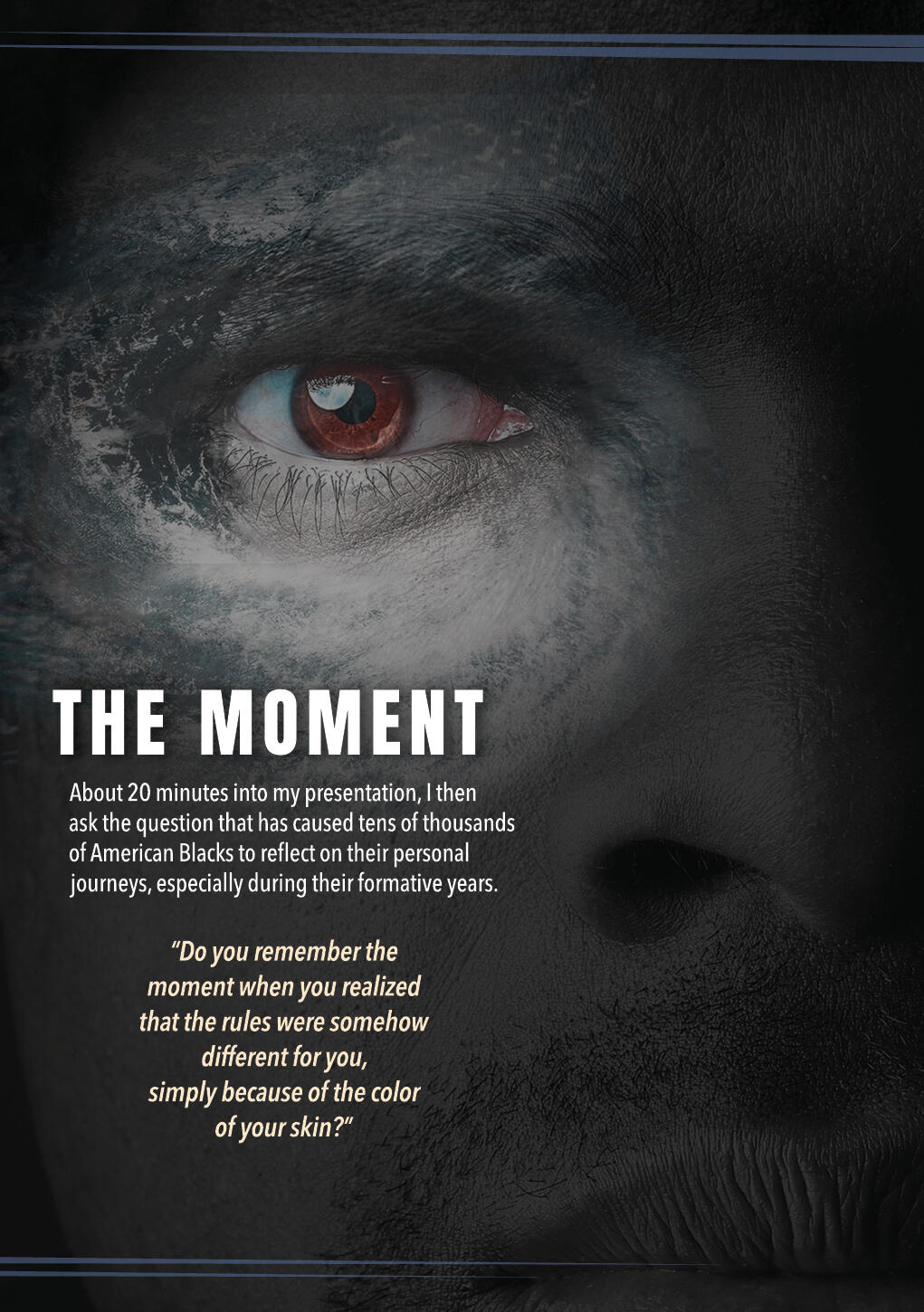
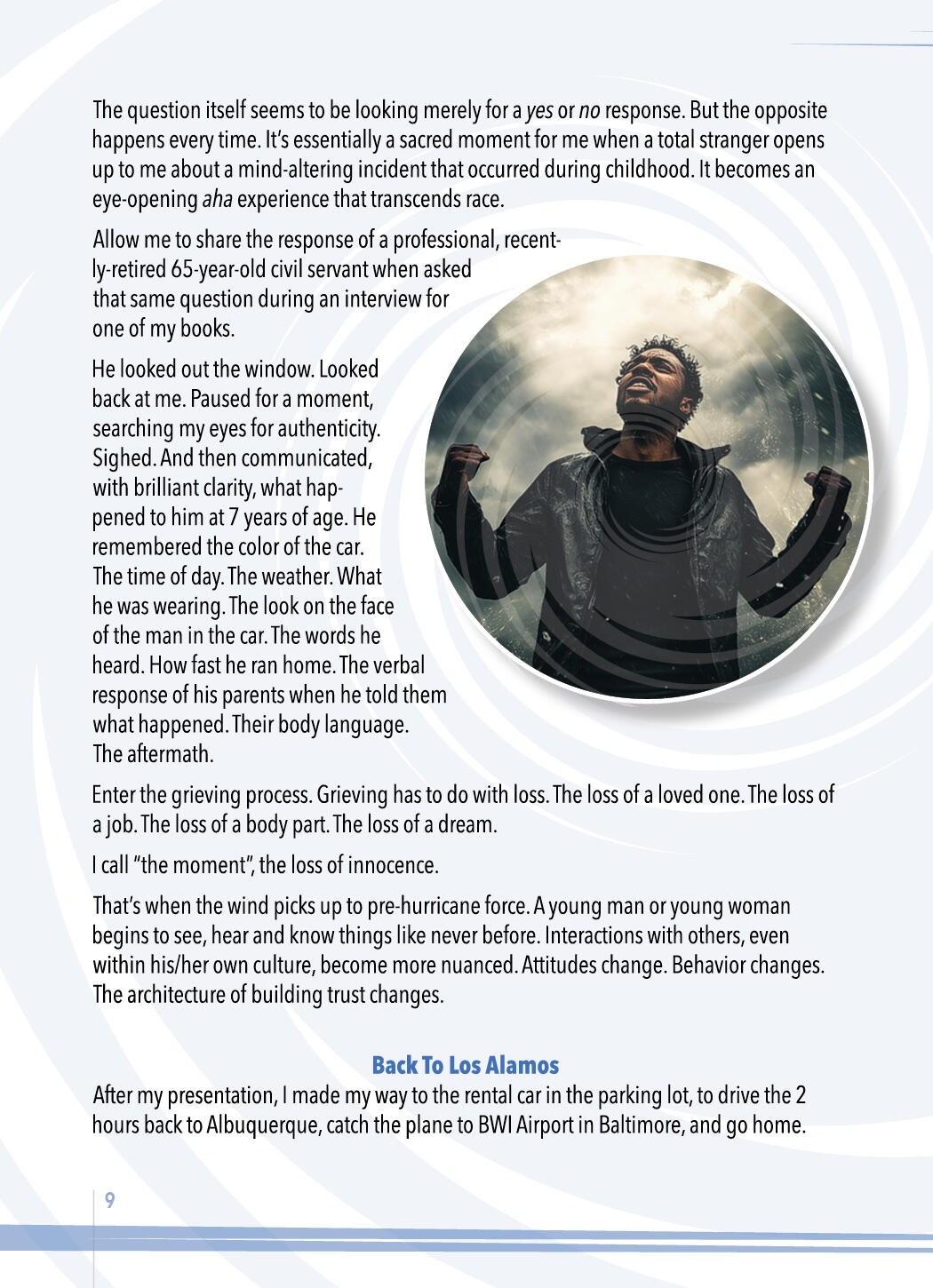
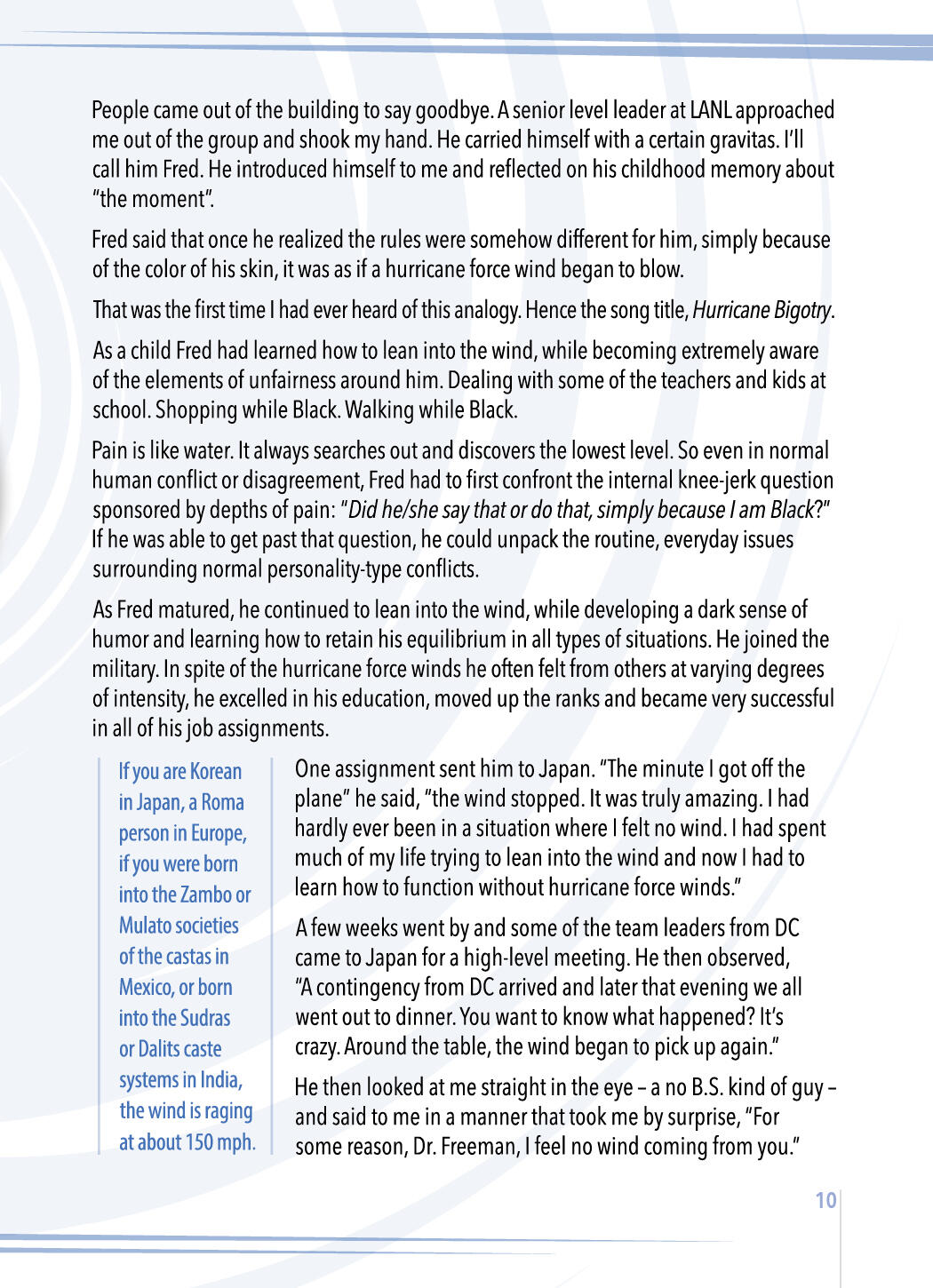
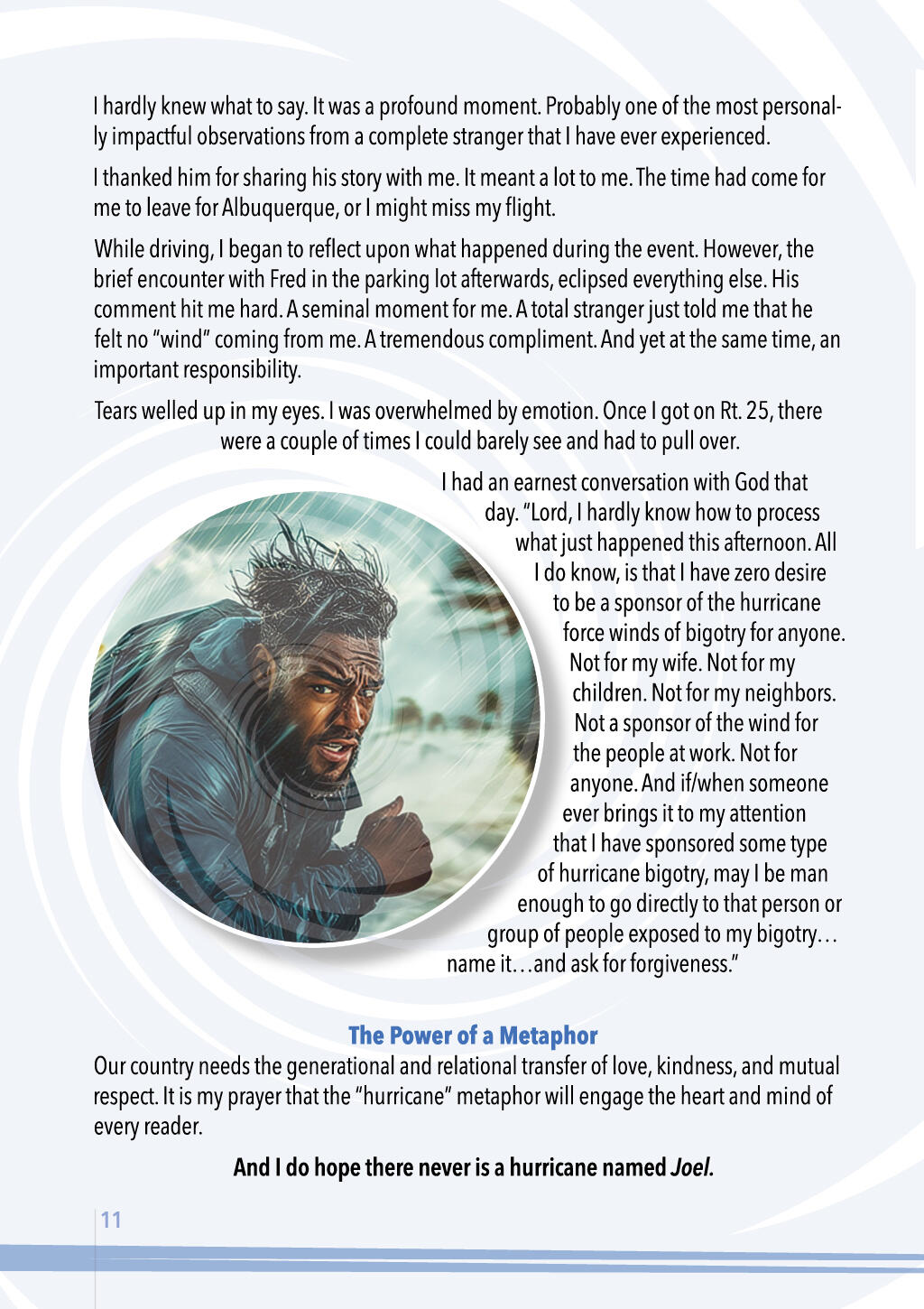
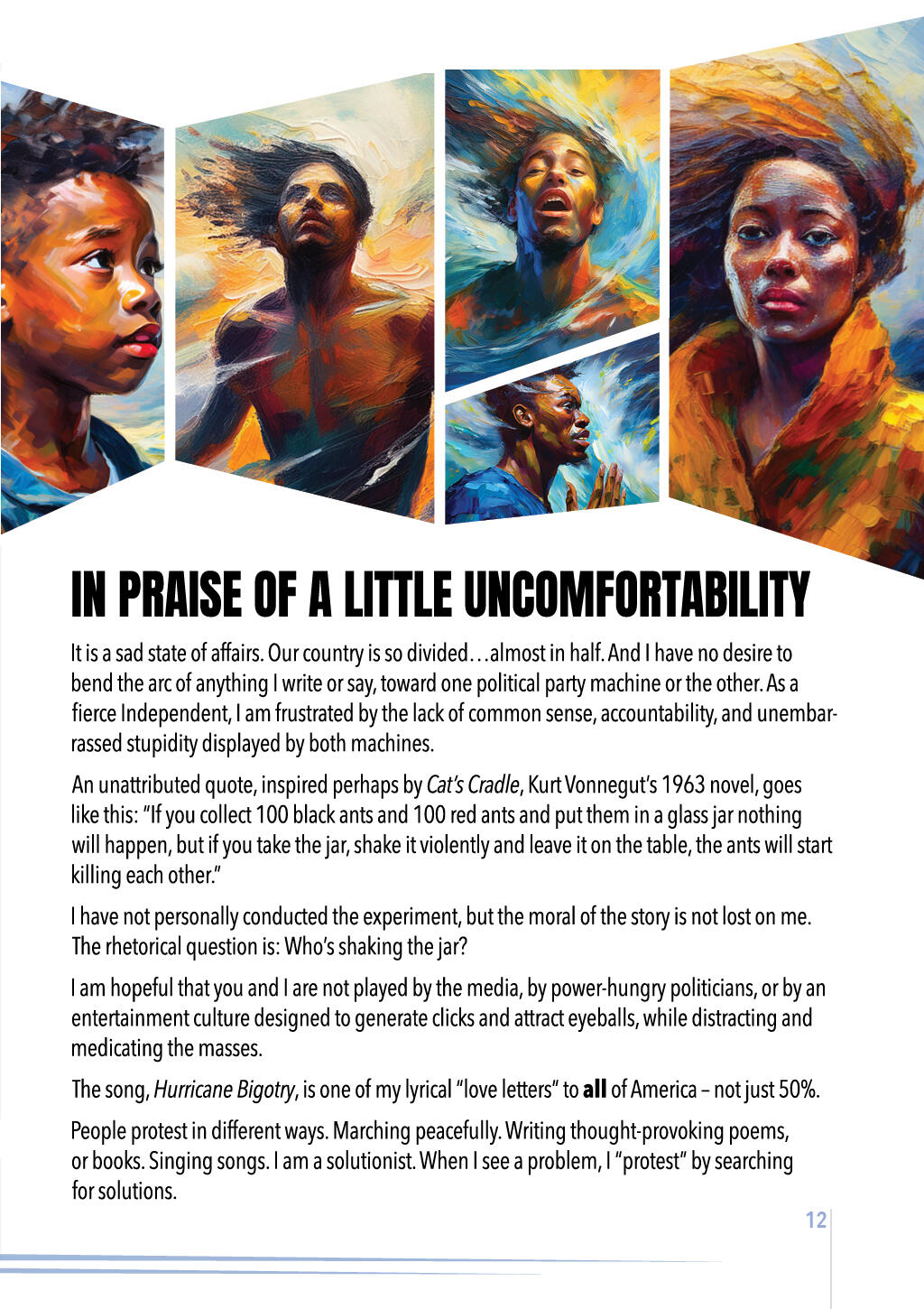
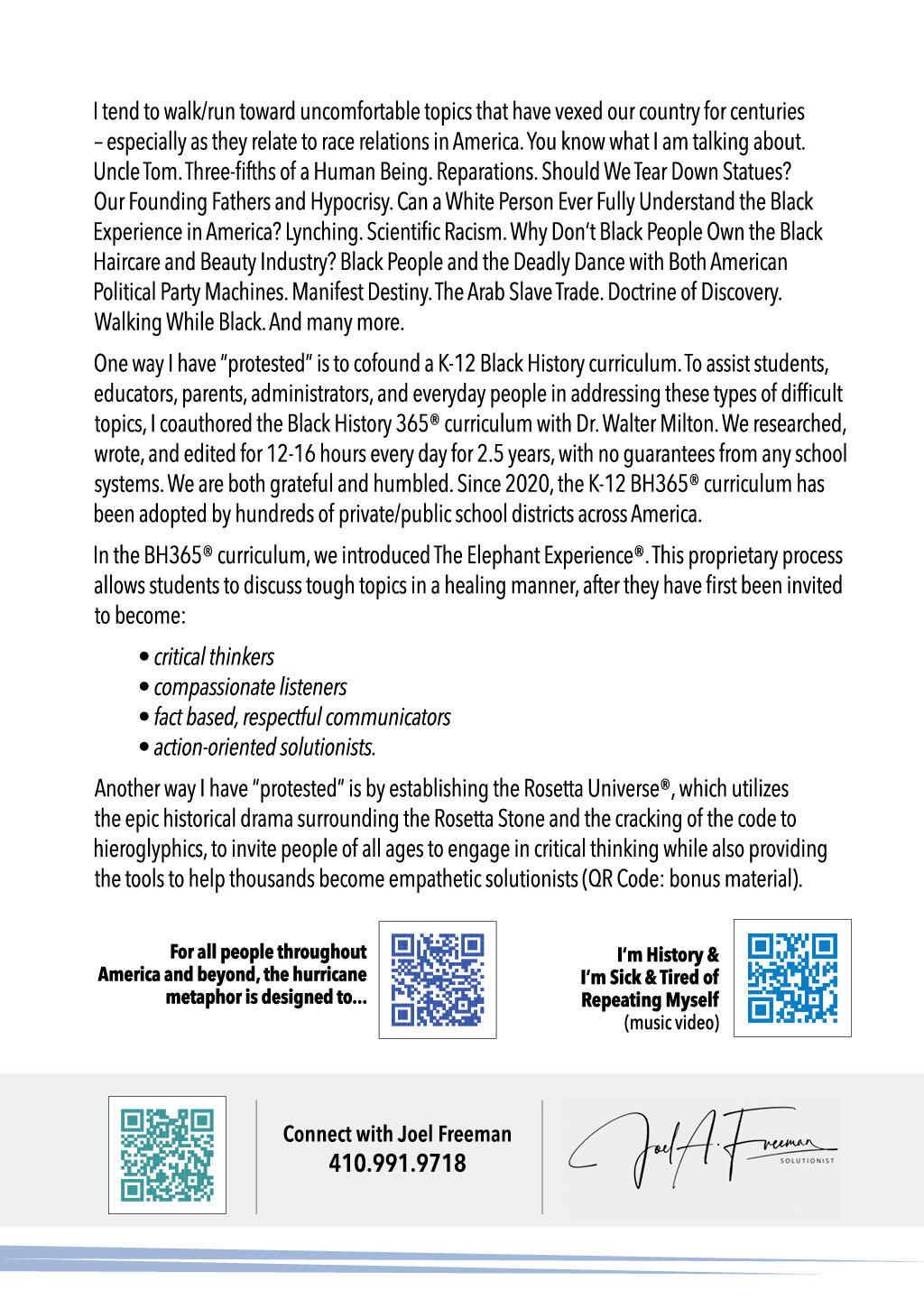
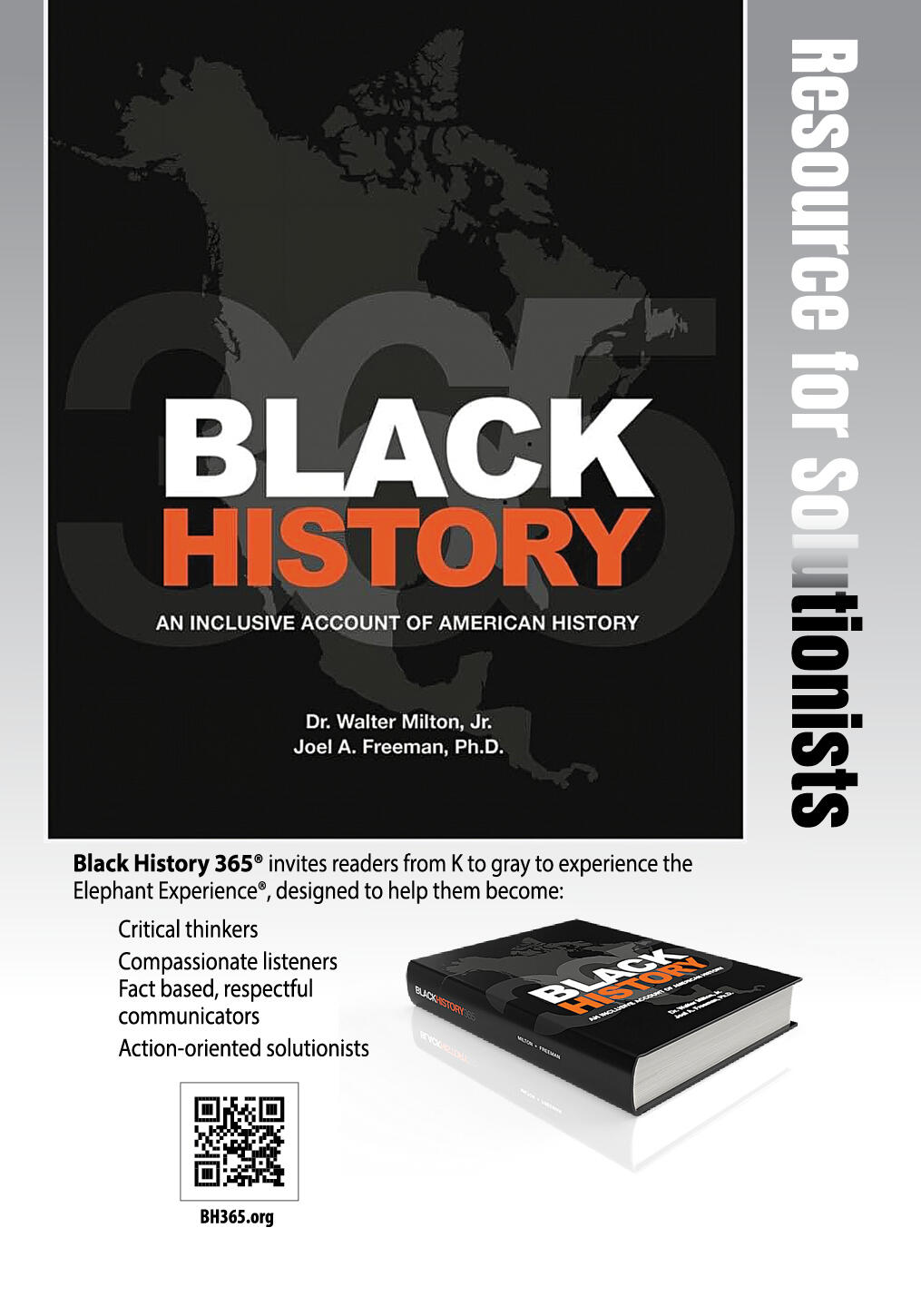
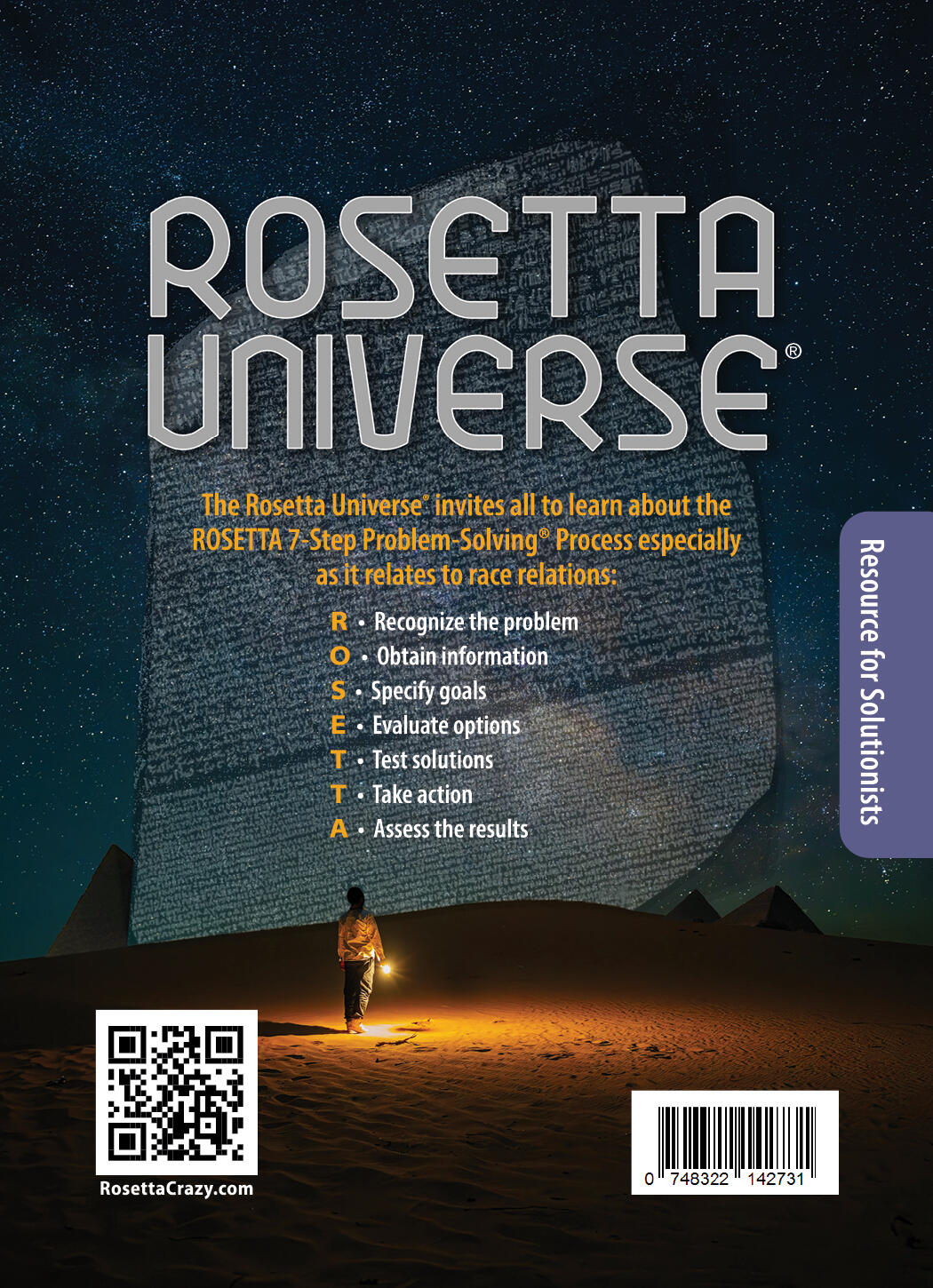
Give to a friend. Click Below To Order a Copy of
HURRICANE BIGOTRY
Conversation Starter Resource
BONUS MATERIAL
TABLE OF CONTENTS
A. In Praise of a Little Uncomfortability
B. Music Video: I'm History & I'm Sick & Tired of Repeating Myself (3:29)
C. Seeking First to Understand Before Seeking to be Understood
D. Discussing Hot Topics Online
E. Ivan Van Sertima
F. Ego, Confidence, & Pressure
*. Bottom of Page: Contact Dr. Joel A. Freeman
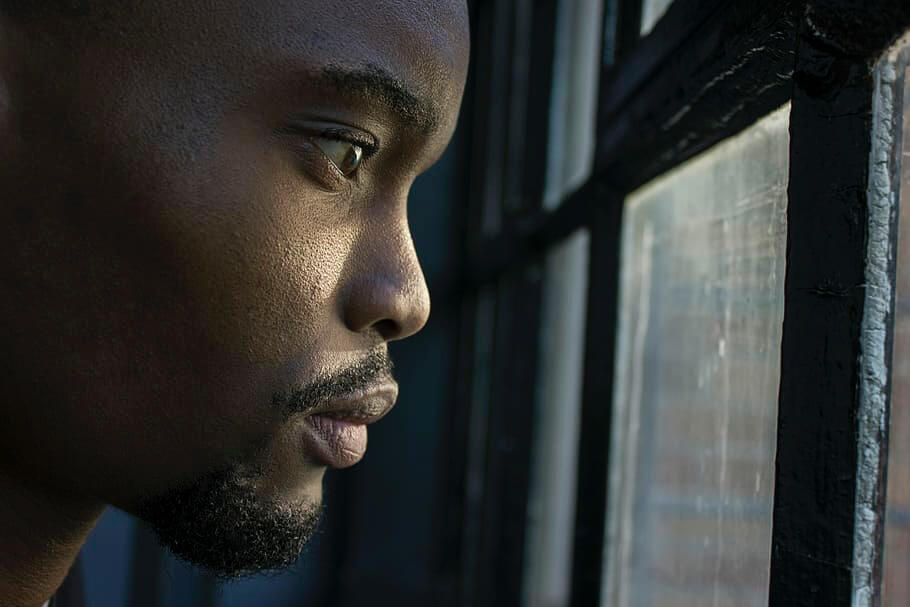
IN PRAISE OF A LITTLE UNCOMFORTABILITY
A. It is a sad state of affairs. Our country is so divided…almost in half. And I have no desire to bend the arc of anything I write or say, toward one political party machine or the other. As a fierce Independent, I am frustrated by the lack of common sense, accountability, and unembarrassed ineptness displayed by both party machines.An unattributed quote, inspired perhaps by Cat's Cradle, Kurt Vonnegut's 1963 novel, goes like this: "If you collect 100 black ants and 100 red ants and put them in a glass jar nothing will happen, but if you take the jar, shake it violently and leave it on the table, the ants will start killing each other."I have not personally conducted the experiment, but the moral of the story is not lost on me. The rhetorical question is: Who's shaking the jar?I am hopeful that you and I are not played by the media, by power-hungry politicians, or by an entertainment culture designed to generate clicks and attract eyeballs, while distracting and medicating the masses.The song, Hurricane Bigotry, is one of my lyrical love letters to all of America – not just 50%.EMBRACING DIFFERENT TYPES OF PEACEFUL PROTESTPeople protest in different ways. Marching peacefully. Writing thought-provoking poems, or books. Singing songs. I am a solutionist. When I see a problem, I "protest" by identifying societal problems, searching for some options, and then helping to create solutions.Once your “WHY” is discovered,
you can bear any Who, What,
Where, When, and/or How.Hence, I tend to walk (sometimes run) toward uncomfortable topics that have vexed our country for centuries – especially as they relate to race relations in America. You know what I am talking about:• Uncle Tom
• Reparations
• Lynching
• Scientific Racism
• Manifest Destiny
• The Arab Slave Trade
• Doctrine of Discovery
• Walking While Black
• Three-Fifths of a Human Being
• Should We Tear Down the Statues?
• The Soft Bigotry of Low Expectations
• The Soft Bigotry of No Expectations
• Our Founding Fathers and Hypocrisy
• Why Don't Black People Own the Black Haircare and Beauty Industry?
• Can a White Person Ever Fully Understand the Black Experience in America?
• Black People and the Deadly Dance with Both American Political Party Machines
• And many more…BLACK HISTORY 365®One way I have "protested" is by cofounding a K-12 Black History curriculum publishing company (see inside back cover). To assist students, educators, parents, administrators, and everyday people in addressing these types of difficult topics, I coauthored the Black History 365® curriculum with Dr. Walter Milton. We researched, wrote, and edited for 12-16 hours every day for 2.5 years, with no guarantees from any school systems. We are both grateful and humbled. Since 2020, the K-12 BH365® curriculum has been adopted by well over 400 private/public school districts across America.In the BH365® curriculum, we introduced The Elephant Experience®. This proprietary process allows students to discuss tough topics in a healing manner, after they have first been invited to become:• critical thinkers
• compassionate listeners
• fact based, respectful communicators
• action-oriented solutionists.ROSETTA UNIVERSE®Another way I have "protested" is by establishing the Rosetta Universe® (see back cover) which utilizes the epic historical drama surrounding the Rosetta Stone and the cracking of the code to hieroglyphics, to invite people of all ages to engage in critical thinking while also providing the tools to help thousands become empathetic solutionists.For all people throughout America and beyond, the hurricane metaphor is designed to foster conversations across the racial divide. I am hoping and praying that the value of mutual respect and the spirit of understanding will permeate everyone reading this information.LOVE FOR BLACK PEOPLEThe Hurricane Bigotry song you have already heard was written especially for people of African descent, who may have been searching for a metaphor for what they have already felt -- in varying degrees of intensity -- throughout their lives.The justification for bitterness, rage, and victimhood are at every turn in the road when one climbs into an anger-driven “vehicle”. Without getting too simplistic, the hurricane imagery can help to frame up the right tools and skills for turning justifiable anger into a vision-driven life.The many land mines of discouragement, assumptions, and exhaustion will always be there wherever one goes. Learning to deal with the relentless hurricane force winds will provide the GPS necessary to navigate around those land mines.Harriet Tubman had many obvious reasons for why she should not be the one to rescue people from the devastation of enslavement. She was dealing with her own “hurricane” force winds. As a woman of diminutive stature, she had no previous training. The people she offered to lead north, suffered from the fear of the known, along with the even greater dread of the unknown. Many of her kidnapped friends in the South grappled with the “Stockholm Syndrome”. And who would place their lives into the hands of a woman wrestling with temporal lobe epilepsy, in such an unpredictable, life-threatening venture?But Harriet became a detective of sorts; a sleuth. She valiantly followed the clues and her instincts, learning what it would take to become one of the most God-fearing, fearless and audacious conductors in the Underground Railroad, leading well over 300 “hurricane-ravaged” people to freedom. It was 19 missions in all. She even garnered the respect of equally audacious, God-fearing leaders like Frederick Douglass and John Brown, who referred to her as “General Tubman”.In a similar manner, resilience and hope search relentlessly like detectives do every day, for the clues that will ultimately steer all honest “hurricane-ravaged” travelers to the freedom found in the Truth.In the eye of the storm, he found the Truth,Resilience and hope, his guiding sleuth.Hurricane Bigotry, may rage and shout,But his spirit endures, there's no doubt.We tend to have authority over whatever we can name.When we get specific, we can become terrific.LOVE FOR EVERYONECEOs, educators, pro athletes, politicians, entrepreneurs, and doctors may like to dress casually in sweats and a baseball cap on a Sunday afternoon. They go for a walk, or a drive, catch a movie in a theater, or do some shopping. No one knows who they are or what they have accomplished.Most Black men have a story or two or three that will astonish the average White person. All Black parents wonder about the best way to educate, especially their Black sons, on how to navigate everyday life, without robbing them of their sense of adventure.Most of us who are White do not have a clue.America, with all its wonder and majesty, has some very dark elements that we cannot ignore. Most White people expend much of their energy, desperately trying to avoid being called a racist.EGG SHELLS & THE RISK FACTORThe "Egg Shell" Effect: Some books discussing America’s racial divide or corporate diversity initiatives leave the readers or participants in such a state of hyper-awareness about their differences that everyone is left walking on egg shells. On edge. Nervous. Fearful of saying something stupid. Confused. Risk-averse or risk-neutral. And precious little sense of humor.Witnessing the tension and emotions surrounding the racial issues in the USA as a young man, initially made me rather tentative about sharing my true feelings.Early in my journey as a White male in the presence of Black people in America, I was afraid of blurting out something stupid or irrelevant. So, I avoided uncomfortable topics altogether. Hid my true thoughts. Walked on eggs shells.Not anymore. As I matured, I developed a high-risk approach to living my life in community with others who do not look like me. Sometimes I would say early on, in so many words, “When, not if, I say something stupid, you can attack my head (I’m not thinking properly), but not my heart (I really do have good intentions and I want to learn).I’m wired differently. I have a White consciousness. And, because of my upbringing, I also have a Canadian consciousness. No matter how hard someone may attempt it -- and some have tried -- I refuse to book an unwarranted “guilt trip”.Most of the time, I let it go. But on rare occasions where it is necessary, I will respond with, "There's something you need to know about me. I am not motivated by guilt."Mark Twain had an interesting perspective that has caused me to take various family members with me in my travels all over the world.In Innocents Abroad (1869) Twain wrote, “Travel is fatal to prejudice, bigotry, and narrow-mindedness, and many of our people need it sorely on these accounts. Broad, wholesome, charitable views of men and things cannot be acquired by vegetating in one little corner of the earth all one's lifetime.”The “Anti-Egg Shell" Effect: In the financial world there are some basics investment concepts that may help us understand the best way to develop genuine cross-cultural friendships that benefit all:• Low Risk = Low Reward
• Medium Risk = Medium Reward
• High Risk = High RewardWe need to understand the risk/reward ratio. The higher the personal risk of vulnerability, curiosity and openness, the greater the relational payoff. It's the wisdom that emerges from the curiosity-driven life.CONVERSATION STARTER: Allow this song and story to do some of the heavy lifting for you in launching important conversations with others around you.Consider giving this behind-the-music story, with the song link, to a few friends or coworkers of African descent. Ask them to listen to the song, and then get together to hear their real-world experiences. Quantity copies available.Remind yourself of the times throughout your life that you have felt like someone truly listened to you without judgment. As your friend is sharing his/her reflections on Hurricane Bigotry keep the spotlight on the other person by asking open-ended questions that help you gain more understanding.One may believe in pulling one's self up by the bootstraps...but most of us as Caucasians have never really spent the time to listen.When uncomfortable topics like reparations, statues, scientific racism, and walking while Black are raised, our default is to say something like, "My ancestors came from their own hardship in ________, and were never involved in slavery, so..." While it may be factual, eyes glaze over and it becomes apparent that this is not a good topic to discuss with you – minimizing the potential for meaningful conversations in the future.This is not a slam on those of us who are White or anyone else. We all are who we are, with opportunities for personal growth at every turn. And it is important for all of us to be comfortable in our own God-given skin, which includes every tone. And some how, in some way get along with each other.It's all about mutual respect, asking open-ended questions, listening, and truly hearing.It's also an invitation for all of us to seek to understand before seeking to be understood.
B. I'M HISTORY & I'M SICK & TIRED OF REPEATING MYSELF
CLICK BELOW
(3:29)
Seeking to Understand
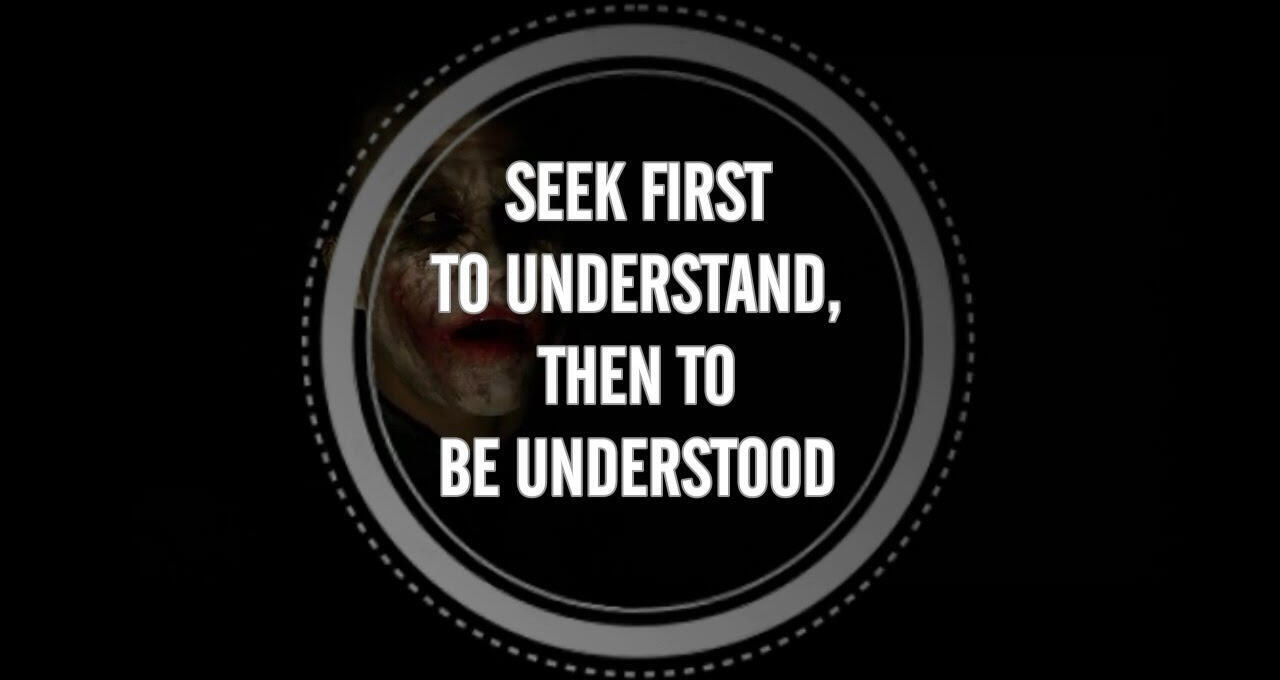
C. Let’s explore 8 ideas.Seeking first to understand…
1. … does not preclude the need to be understood.
Seeking first to understand…
2. … does not guarantee that you will be understood.
Seeking first to understand…
3. … is extremely tough, especially at the beginning stage of such a journey. Everything within is silently screaming to be understood. Don’t try to grab the spotlight to put it back on you and your need to be understood. Destroy the power of those silent screams by neglect.
Seeking first to understand…
4. …is all about the chronological sequence — first…then.
Seeking first to understand…
5. … just might, in time, create a sense of curiosity within the other person. Without feeling the need to force the situation, there just might come the time when your need to be understood will be met. Don’t rush it. Practice humility. Be careful about your tone, timing, and tact. But be fully aware when that opportunity organically presents itself.
Seeking first to understand…
6. … is most certainly the better way to go through life. Watch people, regardless of race, religion, or creed, blossom before your very eyes as they are experiencing what it’s like to truly be heard…perhaps for the first time.
Seeking first to understand…
7. …provides the freedom to enjoy the humor (even laughing at ourselves) as one of the side benefits of greater understanding, as we delight in learning about ourselves and others around us.8. With God’s help…in all relationships for the next 40 days — friends, spouse, children, siblings, extended family, coworkers,
neighbors and more, just might become a habit.When seeking first to understand, you just might be amazed by how much joy and satisfaction fills your heart, regardless the outcome. God is your audience.NOTE: The Black History 365 curriculum project has developed a proprietary process that allows people with opposite views to discuss hot topics in a manner that creates an atmosphere for healing. We call it “The Elephant Experience” and it is making a positive impact in classrooms and in other venues across America. Learn more here: www.BH365.org

DISCUSSING HOT TOPICS ONLINE
D. Has our world has gone stark raving mad? Try launching a rational discussion on any of the following hot topics on Facebook or some other social media platform: Politics. Religion. Sharia law. Mandates. Christianity. Vaccines. Climate. Border issues. Atheism. Creation/evolution. Immigration. Classism. Wall Street. Criminal justice system. Race relations. Transgenderism. Abortion. You name it.If you express an opinion that steps out of line with what the general media promulgates on any of the previously mentioned topics, you will get shouted down. You know its true. More heat than light. It is my observation that common sense, a moral compass, and basic decency are a rare commodity.This shift has happened in your lifetime and mine.There are bullies at every corner to shame you into silence with incendiary labels: ______-phobic, bigot, racist, idiot, et al.What has caused this? I have some ideas to consider that may sound simplistic. 24/7 cable news is a hungry beast, demanding fresh red meat every news cycle. Pundits and other experts talk at…or past…each other. Little chance for relationship-building as they careen from one news cycle to the next, driven by focus-group-tested sound bites.Social media has provided a supposed anonymity that permits some to be absolutely disrespectful without the normal repercussions. Take a look at pretty much any blog or article published on the Internet. Within 8-10 comments people are blasting previous posters with insults and calling each other names.I have some generic thoughts about how we can engage in hot topics online.SUGGESTIONS FOR CIVIL DISCOURSE1. Don’t be afraid to hear/read what critics have to say – you may learn something. Remember...it's what we learn after we think we know it all that really counts.2. Give them your ear – but within reason. Ear reverently. If you can see certain aspects of their side, they’re more likely to take a look at yours. Foul language or name-calling is not the basis for a mutually-respectful conversation.3. Don’t take it personally – most critics are attacking ideas, not people. Choose curiosity over arrogance or confrontation.4. Don’t try to convince – present your ideas in an orderly manner, but remind yourself that most critics cannot be convinced.5. If critics choose to remain anonymous, ignore them – cowards tend to hide behind the supposed anonymity of the Internet.6. Keep your ego out of the conversation – practice emotional intelligence. When possible, create space between the critique and the response. Time can give perspective.7. Feedback is your good friend – use it if it’s useful. Whatever doesn’t kill you makes you stronger and smarter. There are three main ways to deal with feedback:
a). ignore it
b). accept it all
c). figure out what’s relevant and actionable, and use it to learn and grow in your research skills.8. Do your research – Look at the BIG picture. The media is the only business in America specifically protected by the US Constitution. However, most of the major American media is controlled by only six conglomerates. You know their names. Which, in turn, are heavily influenced regarding content, because of majority share holdings by three major investment firms, with trillions of dollars under asset management. Follow the money. Check it out, make common sense deductions, and don't get played.When much of the if-it-bleeds-it-leads media is pumping up a particular racially-charged incident that fits a certain narrative, first ask yourself this question: Why did they choose to promote this particular situation over other similar type situations that have happened recently?Allow for a bit of time for the facts to emerge. Think Jussie. For instance, try waiting for at least 3 days before commenting…if at all.Great minds discuss ideas; average minds discuss events; small minds discuss people. - Eleanor Roosevelt
PROFESSOR IVAN VAN SERTIMA
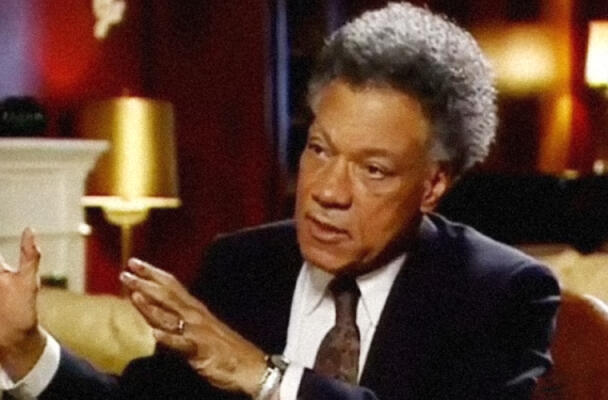
E. My interest in Black History was launched in earnest well over 4 decades ago in 1980 when some Black pro athletes asked me questions about the role ancient Africans played in biblical and extra-biblical history.I didn’t have a clue. I began researching the topic so that I could at least respond somewhat intelligently to the plethora of topics that came up.As we have already learned, I was one of the first chaplains in the history of the NBA, starting in 1978 with the Washington Bullets and retiring 20 seasons later in 1998.I had heard of Ivan Van Sertima and had seen some old, grainy VHS videos of Ivan either in a debate or lecturing. I knew that he was a professor of Africana Studies at Rutgers University and was revered as a man of great intellect and integrity.In the early 1990s I somehow got ahold of his home phone number and I called him. This was during the pre-digital era. His wife, Jaqueline, answered. I asked to speak to Ivan. Even though she put her hand over the receiver, I could hear her whispering to him about some gentleman wanting to talk with him.When he came on the phone, I said, “Hello, Ivan, I have heard a lot about you and I would like to get to know you. I have much to learn from you. And I would hope that you would like to get to know me also.”We talked for at least 45 minutes in that first encounter. A great conversation. He made me feel at ease and extremely comfortable. Near the end of the conversation, he asked for my home address. I didn’t think anything of it and gave it to him.Approximately 3 weeks later a big box filled with at least 15 volumes of his books arrived unexpectedly in the mail. I was blown away. There were topics about Black presence in Asia, the Olmec civilization, they came before Columbus, the Moors, and so much more.The one book that immediately grabbed my attention was Egypt Revisited. Reading that book and seeing the images was kind of like wrapping my brain around a telephone pole at 130 mph. A life changing experience. So much so that, after a few chapters, I called Ivan.After thanking him profusely for such a kind gift of knowledge in literature, I asked him if he would consider becoming my primary historical guide and mentor. To my great surprise, he consented.Wow!! The many conversations we had as the months and years passed!! I only wish I could explain the essence of hours upon hours of discussing wide-ranging topics germane to ancient African history. He was extremely patient with me, allowing me to ask any and all questions ricocheting about in my little pea brain.In the video taped presentations I had seen, Ivan was powerful and authoritative, holding the audience in the palm of his hand. In our phone conversations he was almost shy. I had to “prime the pump” with questions and then he would go into great, elegant detail with me. I’d listen and take notes.Our friendship deepened. For instance, it was a great honor and privilege when Ivan opened up with me about some of the struggles and disrespect he was experiencing in the world of academia. I will not go into detail, but he was very sad at times by the way some powerful leaders actively sought to marginalize him. Even though we never met in person (which I regret), we became very good friends. He gave me a front row seat to the struggles in his journey.Every Christmas season I would receive a signed card from him and Jacqueline.One memorable conversation was when I asked him about his view of the Jesus of the Bible. Many Afrocentric scholars point to a number of legitimate, historically documented problems they have with how Christianity was used by pro-slavery leaders in the South to try to justify enslavement and the Slave Trade itself.Frankly, I wasn’t sure how Ivan would respond. There was a moment of silence and then he said quietly and with great emotion, “Oh yes, I love Jesus Christ with all my heart.”That meant more to me than anything else he could’ve said at that moment. He then went on to eloquently describe the impact & influence of Augustine, Cyprian, Tertullian and other 2nd to 4th century Christian scholars — especially in North Africa — long before the travels of European explorers into central Africa starting in the mid-1800s.Ivan passed away in 2009. The years have clicked by and I still miss him greatly — our conversations and our friendship…
Ego, Confidence, and Arrogance
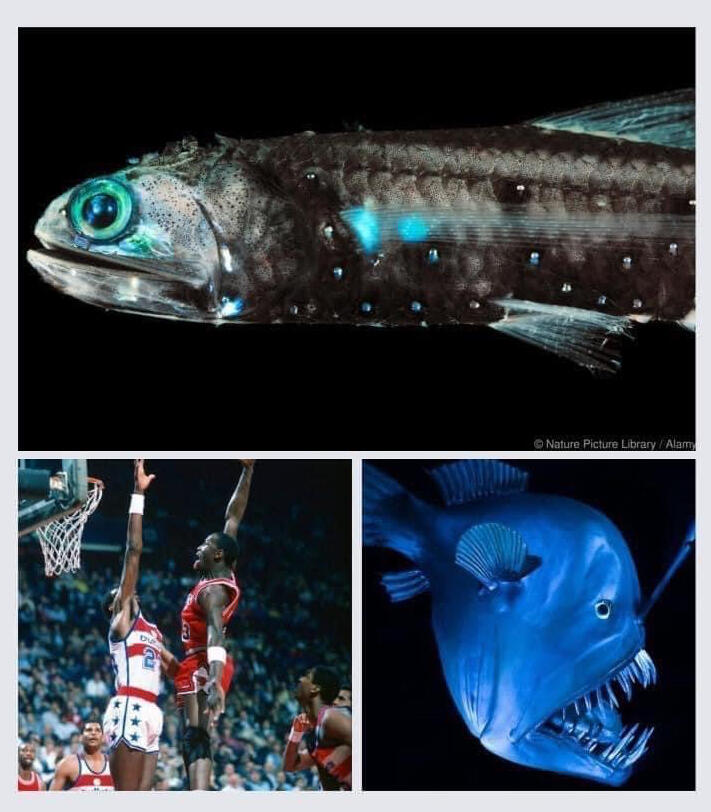
F. I remember talking with NBA star, Wes Unseld (Washington Bullets center) many years ago about the stratospheric pressures experienced by pro athletes at the NBA level.I was intrigued by one of the things he said...which went something like this: "You must have a big ego to play at this level. If you go up against a 'Michael Jordan' you had better come at him hard, believing that his 'wheels have fallen off' and you can take him. If you don't you will end up on a poster in WalMart with Michael's tongue hanging out...dunking all over your bad self."Not a pretty picture for the one being dunked on...I have always agreed with Ken Blanchard’s acronym, E.G.O. = Edging God Out. Even though it was hard for me, at the time, to understand why a big ego was necessary anywhere in life, Wes Unseld’s perspective has remained in my memory.Once I substituted the word "confidence" for "ego" in his statement, it all began to make sense to me.CONFIDENCE can be likened to the internal pressure required to deal with external stress and pressure. Allow me to illustrate my point.PRESSURE FROM WITHOUTAt sea level, the external atmospheric pressure on your skin is 14.7 pounds per square inch, or PSI. It’s necessary. In simple terms, this outside pressure keeps our bodies from exploding.PRESSURE FROM WITHINTo match the outside pressure there are different aspects of internal pressure that keep our bodies, with its various parts, from imploding:The pressures in various parts of the body can be measured and often provide valuable medical indicators.• For instance, the shape of the eye is maintained by fluid pressure, called intraocular pressure. When the circulation of fluid in the eye is blocked, it can lead to a buildup in pressure, a condition called glaucoma.• Some of the other pressures in the body are spinal and skull pressures, bladder pressure, pressures in the skeletal system.Our internal pressure is usually equal to the outside air pressure (the weight of the atmosphere pushing down on us.) We can become uncomfortable whenever we venture away from sea level; our internal pressure is no longer equal to the ambient pressure. This is why our ears hurt when we go up in a plane or when we dive too deep underwater.TAKING THE DEEP DIVEFor instance, every 33 feet a diver descends the weight of the water above them increases by 15 pounds per square inch. At only a few feet below the surface, the water pressure is already too great for the muscles that expand and contract our lungs to work, making it extremely difficult for us to draw breath. A couple feet of water pressure isn’t enough to do serious damage yet, but looking at deeper levels shows how pressure affects us a little more gradually.At a depth of around 100 feet, (remember, you’d have four times the normal pressure pushing down on you at this point), the spongy tissue of the lung begins to contract, which would leave you with only a small supply of air that was inhaled at the surface.During their deepest dives, a diver’s heart rate can dip to only 14 beats per minute; for reference, this is about a third of the rate of a person in a coma. Most professional free divers don’t go past 400 feet deep.WILLIAM BEEBE’S RESEARCHDr. William Beebe was a pioneer in deep-sea exploration. With support from the National Geographic Society and the New York Zoological Society, Beebe constructed the Bathysphere (bathy = deep). In this steel sphere he would be lowered to depths of over 2,500 feet. The thick walled sphere was designed to withstand the great pressures of the ocean deep. The sphere had two thick quartz windows for viewing. To test the windows the bathysphere, unoccupied was lowered to 3,000 feet. When the great steel ball was hauled up, Dr. Beebe said that if he had been in the bathyshpere he would’ve been decapitated and crushed.If a human being spent a mere one second without any protective bathysphere at the bottom of the Marianna Trench (approx 36,000 feet) that person would be instantly crushed beyond recognition.Yet, there are fish who live quite nicely at the bottom of the ocean. Their fish skin is not measurably thicker than the skin of the fish who live near the surface, yet they do not implode under the extreme pressure.PURPOSEWHAT’S THE POINT of what I have communicated thus far? Glad you asked.When you are tempted to implode under the pressure of elevation at the mountain top or under the pressure of the deep — like fish at the bottom of the ocean — the answer is not necessarily to develop a thicker skin.After dealing with a terrible situation let’s not develop a protective thicker skin. We can retain a crazy sense of humor, an open heart, creativity, hope, a forgiving spirit, and giving people the initial benefit of our trust. All that can add up to confidence, the internal positive pressure we need to thrive regardless what’s happening around us.• WAY too much internal pressure = the big head…arrogance…an explosion looking for a place to happen.• WAY too little internal pressure = false humility…self degradation…success sabotage…an implosion looking for a place to happen.Whether we are in a situation that feels like we’re on top of Everest or at the bottom of the Mariana Trench, you and I need the proper internal pressure (confidence) — not in our own skills, abilities or ego, but in God — to handle whatever external stress/pressure we are experiencing.Over the years I’ve seen a number of people from all walks of life develop “just the right amount of confidence for their circumstances” — including pro athletes.We have very little control over what happens to us externally. However, we do have responsibility for how we allow ourselves to be filled with the Holy Spirit.And that’s when we experience true confidence internally that can match any type of external pressure at any level.

Click on logo above to order copies of booklets.
Want to order a quantity of booklets?
Have questions or comments?
CONTACT Dr. Freeman: 410.991.9718
………………………………………………..
HurricaneBigotry.com
………………………………………………..


